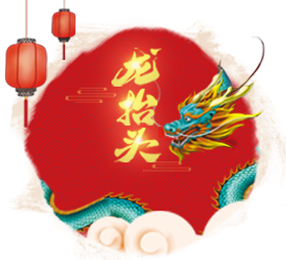
A well-known Chinese phrase goes, “Er yue er, long tai tou,” meaning, “On the second day of the second month, the dragon lifts his head.” The traditional Chinese Longtaitou Festival, or Dragon-Head-Raising Festival, falls on the second day of the second lunar month every year, and marks the start of spring and farming.
Ancient people believed that after this day, rainfall increases because the rain-bringing Dragon King awakens from his winter sleep. The festival celebrates ancient Chinese agrarian (农业的) culture. While some traditional ways to celebrate it are no longer practiced, others continue to exist.
The most famous tradition is getting a haircut. Some believe that going to the barber on this day gets rid of bad luck, while others believe getting a haircut during the first month of the lunar calendar brings bad luck. According to another saying, cutting your hair in the first month will bring bac luck to your uncle. Although today few pay attention to it, it was once a tradition to line up outside barber shops on the day of Longtaitou, because people hadn’t got haircuts for some time.
People eat tofu balls in East China’s Fujian province during the festival, and often make tofu and vegetable balls to pray for family and business. Fried(油炸的) beans are the traditional festival food for people in parts of Shandong province. Eating chengyao cakes, which are made with sticky rice, during the festival is tradition in Suzhou, East China’s Jiangsu province. Meanwhile other foods, like dumplings, spring rolls and popcorn, are named after dragon body parts to mark the day. Noodles are dragon’s beard (long xu), dumplings are dragon’s ears (long er), spring rolls are dragon’s scales (long lin), and popcorn is dragon’s seeds (long zi).
1.1. What is the main reason for increased rainfall after Longtaitou Festival according to the text?
A The arrival of spring winds.
B The Dragon King waking from sleep.
C The start of farming activities.
D Ancient agricultural rituals.
解析:选B。B细节理解题。根据第二段第一句“rainfall increases because the rain-bringing Dragon King has awakened from his winter sleep.”可知,古人认为,这一天之后,降雨量会增加,因为带来雨水的龙王已经从冬眠中醒来。故选B。
2.2.What do the underlined words “gets rid of” mean?
A Brings in.
B Gives out.
C Sets aside.
D Takes away.
解析:选D。D词义猜测题。根据划线部分后面的“while others believe getting a haircut during the first month of the lunar calendar brings bad luck.”可知,其他人认为在农历正月理发会带来厄运。前后形成意思上的转折,因此前面部分人认为二月二这天理发可以“摆脱”厄运。故选D。
3.3. What is the last paragraph mainly about?
A Special foods eaten during the festival.
B Methods to pray for family safety.
C The history of chengyao cakes.
D Dragon-related food names.
解析:选A。A段落大意题。最后一段主要描述了在“龙抬头”这一天,中国各个地区人们的饮食传统。故选A。
4.4. Where would this text most probably be found?
A A cooking guide.
B A weather report.
C A culture magazine.
D A history textbook.
解析:选C。C推理判断题。本文向我们介绍了中国民间传统节日“龙抬头”,属于文化方面的内容,因此我们可以在“文化”版块读到本文。故选C。